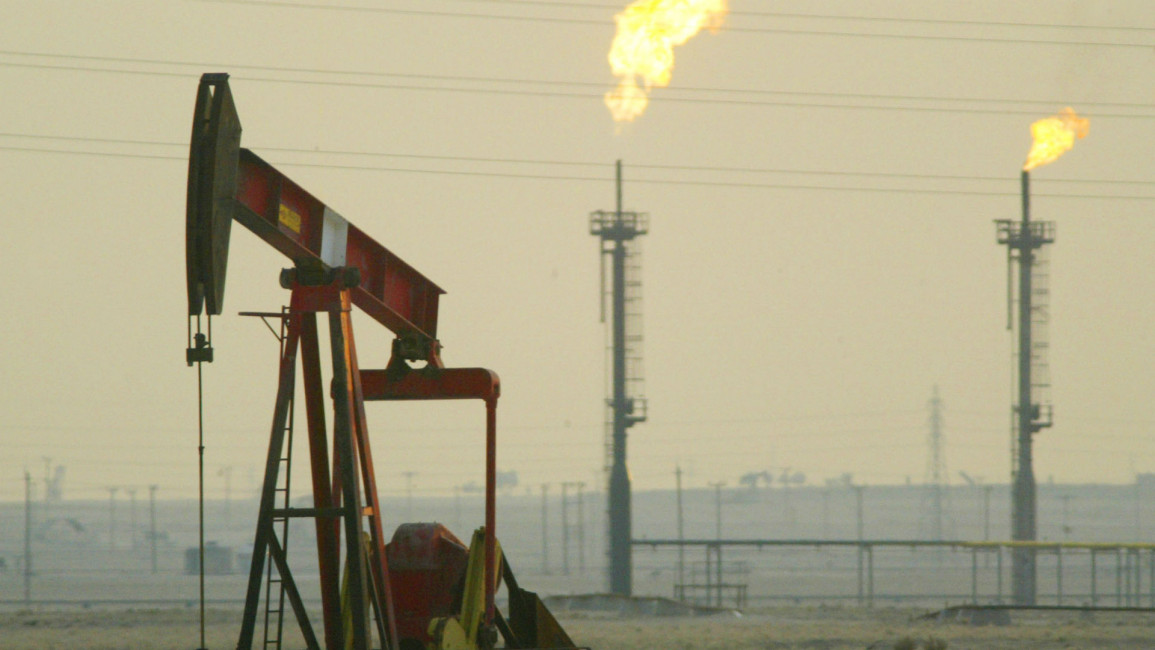Saudi Arabia 'stockpiling oil' ahead of Iran sanctions
Saudi Arabia 'stockpiling oil' ahead of Iran sanctions
New US sanctions on Iran are set to kick-in this month, with Saudi Arabia appearing to stockpile oil ahead of expected shortages.
2 min read
Saudi Arabia appears to be storing oil ahead of Iran sanctions [Getty]
Saudi Arabia appears to be stockpiling oil ahead of expected global shortages brought on by new US sanctions on Iran.
Saudi oil stockpiles have been falling for the past three years, but a report by Bloomberg indicates that Saudi Arabia has finally been filling storage tanks over the past months, as the countdown for new US sanctions on Iran ticks down.
One indicator of a build-up in supplies is that Saudi Arabia used only 430,000 barrels of oil for domestic consumption during this summer's hot months, when it usually peaks to 600,000 due to the use widespread of air conditioning.
Data released by the business website shows that oil consumption also appears to have dropped this summer, too.
Although a slight drop in temperatures this July could explain drops in consumption, Bloomberg said that exports have also fallen so excess oil is likely being stored.
Part of this could be due to Saudi Arabia closing oil shipments through the Bab al-Mandab strait, following an attack on two tankers last month by Yemeni rebels.
But it also coincides with an announcement by President Donald Trump earlier this year that the US will pull out of a nuclear deal with oil-producer Iran.
Tougher new sanctions on Iran will be adopted by Washington on Monday, with Washington also punishing countries and businesses outside the US in an attempt to damage Tehran's economy.
Trump has threatened to sanction any country that buys Iranian oil, which will likely lead to a supply short-fall. Saudi Arabia appears to be willing to take up the slack by pumping out more oil.
The signs are ominous for Iran, where oil exports have fallen by 430,000 barrels a day - or 15 percent - in July and set to drop much further when the sanctions kick-in.
Saudi Arabia has been a strong opponent of the nuclear deal reached between the US and Iran when Barack Obama was president, and the improving relations between the two countries.
Riyadh appears to back Trump's tough rhetoric against Iran, and as the one of the world's leading producers looks willing to provide the economic support needed to lessen the effects of Tehran being taken out of the oil market.
Follow us on Twitter: @The_NewArab
Saudi oil stockpiles have been falling for the past three years, but a report by Bloomberg indicates that Saudi Arabia has finally been filling storage tanks over the past months, as the countdown for new US sanctions on Iran ticks down.
One indicator of a build-up in supplies is that Saudi Arabia used only 430,000 barrels of oil for domestic consumption during this summer's hot months, when it usually peaks to 600,000 due to the use widespread of air conditioning.
Data released by the business website shows that oil consumption also appears to have dropped this summer, too.
Although a slight drop in temperatures this July could explain drops in consumption, Bloomberg said that exports have also fallen so excess oil is likely being stored.
Part of this could be due to Saudi Arabia closing oil shipments through the Bab al-Mandab strait, following an attack on two tankers last month by Yemeni rebels.
But it also coincides with an announcement by President Donald Trump earlier this year that the US will pull out of a nuclear deal with oil-producer Iran.
Tougher new sanctions on Iran will be adopted by Washington on Monday, with Washington also punishing countries and businesses outside the US in an attempt to damage Tehran's economy.
Trump has threatened to sanction any country that buys Iranian oil, which will likely lead to a supply short-fall. Saudi Arabia appears to be willing to take up the slack by pumping out more oil.
The signs are ominous for Iran, where oil exports have fallen by 430,000 barrels a day - or 15 percent - in July and set to drop much further when the sanctions kick-in.
Saudi Arabia has been a strong opponent of the nuclear deal reached between the US and Iran when Barack Obama was president, and the improving relations between the two countries.
Riyadh appears to back Trump's tough rhetoric against Iran, and as the one of the world's leading producers looks willing to provide the economic support needed to lessen the effects of Tehran being taken out of the oil market.
Follow us on Twitter: @The_NewArab



